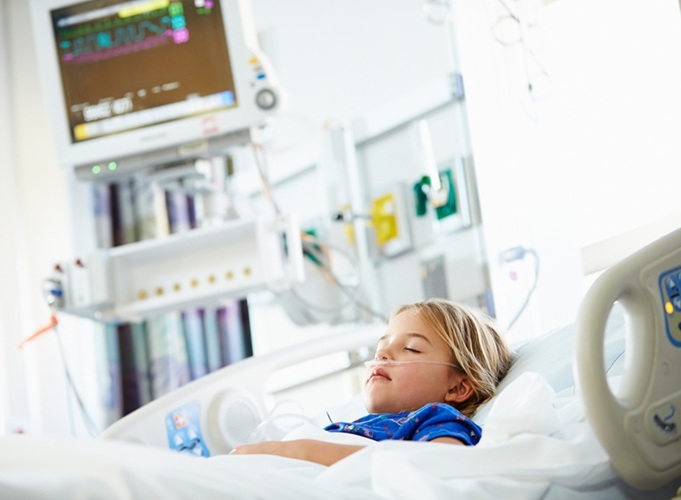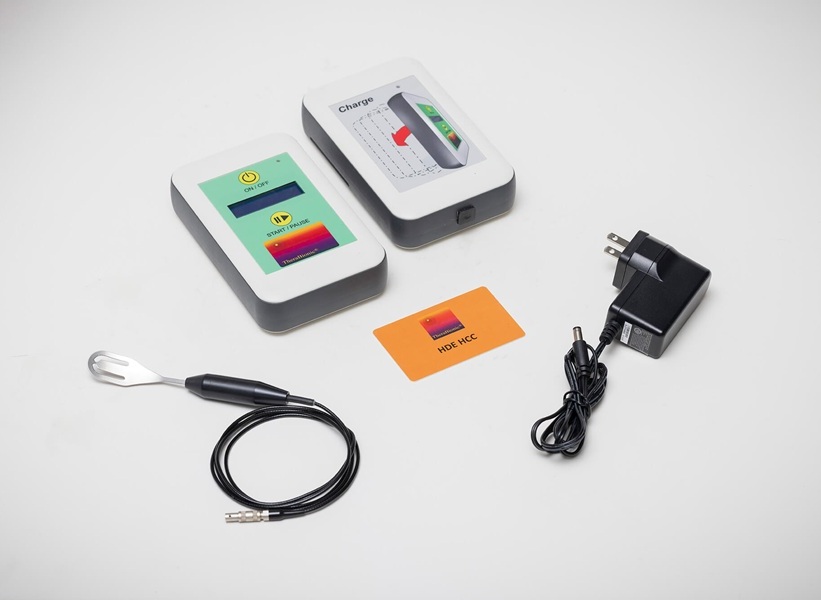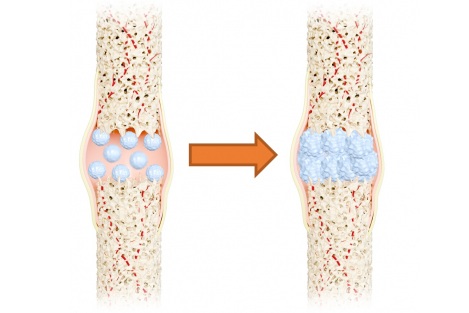AI-Powered Reading Increases Mammography Accuracy
|
By HospiMedica International staff writers Posted on 21 Jul 2020 |
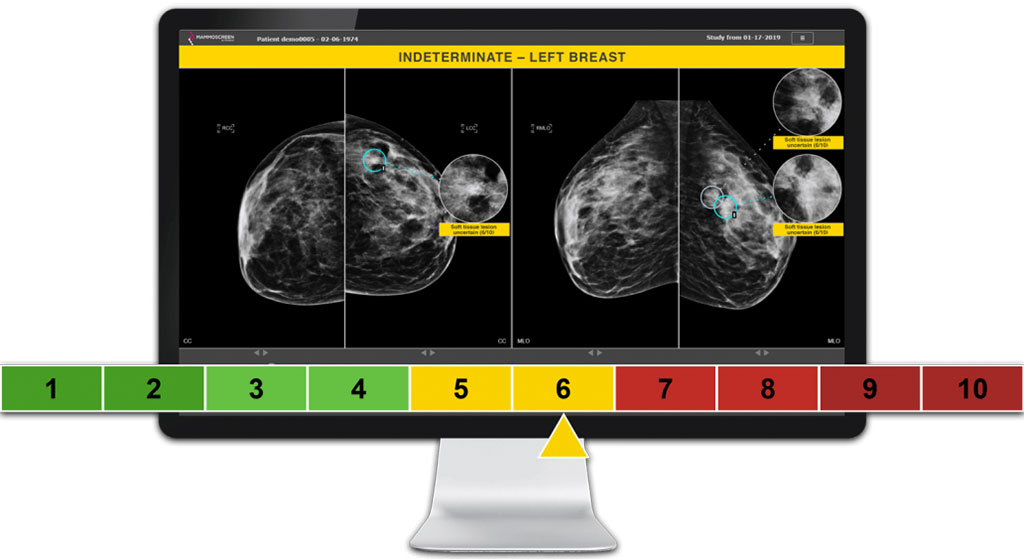
Image: A novel AI platform scores breast cancer malignancy (Photo courtesy of Therapixel)
An artificial intelligence (AI) based software assists radiologists in reading screening mammograms for breast cancer detection.
The Therapixel (Paris, France) MammoScreen software platform is designed to aid interpreting physicians in identifying focal findings suspicious for breast cancer in screening full-field digital mammography (FFDM). The software is designed to automatically detect and characterize soft tissue lesions and calcifications in mammograms and assessing their likelihood of malignancy, using algorithms trained on large databases of biopsy proven examples of breast cancer, benign lesions, and normal tissue. The platform includes a processing server and a web interface.
The results of the analysis are presented in a summary report that characterized suspiciousness of each lesion scored on a scale of one to ten, with one being least likely to reveal malignancy and ten the most likely. Only the most suspicious findings (a MammoScreen score equal or greater than five) are initially marked, in order to limit the number of findings that need to be reviewed. The level of suspicion score is expressed at the finding level, for each breast and overall for the mammogram.
“We believe MammoScreen will provide quick and reliable confirmation of radiologists' suspicions as they read,” said Matthieu Leclerc-Chalvet, CEO of Therapixel. “This AI solution will ensure a more certain assessment by radiologists and a speedier reassurance of women having breast cancer screening exams, resulting in a more efficient workflow and reduced costs for the healthcare system.”
Computer-aided diagnosis refers to comprehensive quantification of tumor phenotypes by extracting a large number of quantitative image features for data mining and precision medicine. In recent years, AI has been used to successfully extract a variety of clinically relevant features, merging them into digital signatures in order to estimate the probability of malignancy of identified breast cancer lesions.
Related Links:
Therapixel
The Therapixel (Paris, France) MammoScreen software platform is designed to aid interpreting physicians in identifying focal findings suspicious for breast cancer in screening full-field digital mammography (FFDM). The software is designed to automatically detect and characterize soft tissue lesions and calcifications in mammograms and assessing their likelihood of malignancy, using algorithms trained on large databases of biopsy proven examples of breast cancer, benign lesions, and normal tissue. The platform includes a processing server and a web interface.
The results of the analysis are presented in a summary report that characterized suspiciousness of each lesion scored on a scale of one to ten, with one being least likely to reveal malignancy and ten the most likely. Only the most suspicious findings (a MammoScreen score equal or greater than five) are initially marked, in order to limit the number of findings that need to be reviewed. The level of suspicion score is expressed at the finding level, for each breast and overall for the mammogram.
“We believe MammoScreen will provide quick and reliable confirmation of radiologists' suspicions as they read,” said Matthieu Leclerc-Chalvet, CEO of Therapixel. “This AI solution will ensure a more certain assessment by radiologists and a speedier reassurance of women having breast cancer screening exams, resulting in a more efficient workflow and reduced costs for the healthcare system.”
Computer-aided diagnosis refers to comprehensive quantification of tumor phenotypes by extracting a large number of quantitative image features for data mining and precision medicine. In recent years, AI has been used to successfully extract a variety of clinically relevant features, merging them into digital signatures in order to estimate the probability of malignancy of identified breast cancer lesions.
Related Links:
Therapixel
Latest AI News
Channels
Critical Care
view channel
Origami Robots to Deliver Medicine Less Invasively and More Effectively
Delivering medicine to ulcers or other internal sites often requires invasive procedures that can disrupt surrounding tissues and lengthen recovery times. Traditional magnetic actuators used in soft robotics... Read more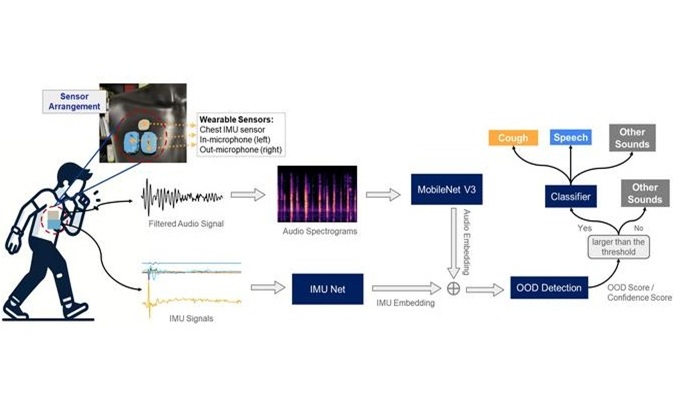
Improved Cough-Detection Technology Aids Health Monitoring
Coughing serves as an important biomarker for tracking a variety of conditions and can help monitor the progress of respiratory diseases or predict when someone’s asthma is being exacerbated.... Read moreSurgical Techniques
view channel
Novel Glue Prevents Complications After Breast Cancer Surgery
Seroma and prolonged lymphorrhea are among the most common complications following axillary lymphadenectomy in breast cancer patients. These postoperative issues can delay recovery and postpone the start... Read more
Breakthrough Brain Implant Enables Safer and More Precise Drug Delivery
Delivering medication directly to specific regions of the brain has long been a major challenge in treating neurological disorders. Current implants and infusion systems typically reach only one or two... Read morePatient Care
view channel
Revolutionary Automatic IV-Line Flushing Device to Enhance Infusion Care
More than 80% of in-hospital patients receive intravenous (IV) therapy. Every dose of IV medicine delivered in a small volume (<250 mL) infusion bag should be followed by subsequent flushing to ensure... Read more
VR Training Tool Combats Contamination of Portable Medical Equipment
Healthcare-associated infections (HAIs) impact one in every 31 patients, cause nearly 100,000 deaths each year, and cost USD 28.4 billion in direct medical expenses. Notably, up to 75% of these infections... Read more
Portable Biosensor Platform to Reduce Hospital-Acquired Infections
Approximately 4 million patients in the European Union acquire healthcare-associated infections (HAIs) or nosocomial infections each year, with around 37,000 deaths directly resulting from these infections,... Read moreFirst-Of-Its-Kind Portable Germicidal Light Technology Disinfects High-Touch Clinical Surfaces in Seconds
Reducing healthcare-acquired infections (HAIs) remains a pressing issue within global healthcare systems. In the United States alone, 1.7 million patients contract HAIs annually, leading to approximately... Read moreHealth IT
view channel
Printable Molecule-Selective Nanoparticles Enable Mass Production of Wearable Biosensors
The future of medicine is likely to focus on the personalization of healthcare—understanding exactly what an individual requires and delivering the appropriate combination of nutrients, metabolites, and... Read moreBusiness
view channel
Philips and Masimo Partner to Advance Patient Monitoring Measurement Technologies
Royal Philips (Amsterdam, Netherlands) and Masimo (Irvine, California, USA) have renewed their multi-year strategic collaboration, combining Philips’ expertise in patient monitoring with Masimo’s noninvasive... Read more
B. Braun Acquires Digital Microsurgery Company True Digital Surgery
The high-end microsurgery market in neurosurgery, spine, and ENT is undergoing a significant transformation. Traditional analog microscopes are giving way to digital exoscopes, which provide improved visualization,... Read more
CMEF 2025 to Promote Holistic and High-Quality Development of Medical and Health Industry
The 92nd China International Medical Equipment Fair (CMEF 2025) Autumn Exhibition is scheduled to be held from September 26 to 29 at the China Import and Export Fair Complex (Canton Fair Complex) in Guangzhou.... Read more











